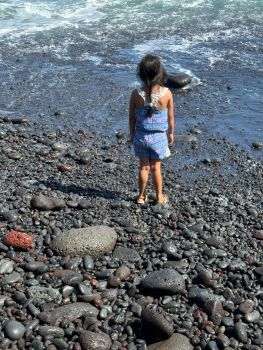Content warning:
This story discusses the challenges of raising a child with Fetal Alcohol Spectrum Disorder (FASD) and may be emotional for some readers. Please take care of yourself as you read and reach out for support as you need.
Introduction
Adopting our daughter at nine months old was one of the most beautiful and life-changing moments of my life. She made me a mom! From the start, we knew she was prenatally exposed to alcohol. Even with my background as a nurse, I needed to learn about and find the right supports for her and our family.
I’m sharing our family’s journey navigating FASD in the hopes that our experience is a gentle reminder to other families going through a similar experience, they are not alone.
FASD is a lifelong disability
It affects the brain and body of people who were exposed to alcohol before birth. Here’s more about FASD:

- It’s a spectrum disorder - This means that no two people who have this diagnosis are exactly alike.
- Effects can vary widely - It can make it harder to remember, pay attention, handle emotions, learn new things, or interact with others.
- It’s not always visible - Many people don’t have physical signs. Some have challenges in their everyday life and need special support. These challenges are not the result of poor parenting or lack of effort, they are caused by permanent changes to the brain caused by prenatal alcohol exposure.
- People with FASD have unique strengths - They can be creative, compassionate, determined, and deeply intuitive. With the right supports in place at home, in school, and in the community, they can thrive.
It can be a struggle
Our daughter needed a formal FASD diagnosis, but the path was not easy. While the process through the Northern Health Assessment Network (NHAN) is comprehensive, it was daunting for us. NHAN serves the North at three locations: Dawson Creek, Prince George, and Terrace. Their staff provide assessments for children suspected of having neurodevelopmental conditions, including FASD, through the provincial Complex Developmental Behavioural Conditions (CDBC) program.
Assessment wait times are up to two years from the date of referral. During this time, families are often left in limbo, trying to manage complex behaviours without a formal diagnosis or access to special supports. I often felt alone and frustrated while waiting for our turn to be assessed. I didn’t have a support group or network to lean on which made the waiting hard.
Find connection beyond the North
Support groups are limited and there wasn’t one available to me locally. That’s why I looked online and found Canada FASD Research Network (CanFASD). Their resources, research, and community connections helped me feel less alone. In October 2025, CanFASD is hosting a national conference to bring together families, professionals, and researchers. Events like this are important as they remind us that support is available. For more information: Canada FASD Conference 2025.
Break the silence
One of the most important things I’ve learned on this journey is the power of words. Talking about FASD needs kindness and no blame. When people blame birth parents or commend adoptive families on their ability to parent a child with extra needs, it stops good communication and hurts the support that families need. Stigma can silence people as it:
- Prevents birth parents from seeking help
- Discourages adoptive families from sharing their experiences
- Isolates children with complex challenges
Approach conversations with compassion
We need to create space for open, honest conversations that are rooted in empathy, understanding, and safety. Kinder words can make a big difference. It shows we're listening and caring. It also helps build trust and reduces stigma, which is very important for families dealing with FASD.
Instead of saying: | Try saying: |
|---|---|
“Why would someone drink during pregnancy?” | “I imagine there are many reasons someone might struggle during pregnancy. What supports are available for families affected by FASD?” |
“That must be so hard, do you ever regret adopting?” | “It sounds like you’ve faced a lot of challenges. What’s been helpful for you and your child along the way?” |
“Isn’t FASD preventable?” | “I’m still learning about FASD. Would you be open to sharing what you’ve learned through your experience?” |
“I don’t know how you do it.” | “You’re doing an incredible job. How can I support you or your family right now?” |
A message to fellow families and care providers

You’re not alone. Raising a child with FASD is tough. The journey often has uncertainty, long waits, and limited support. I can’t count the number of times I’ve cried alone. The journey also has moments of deep connection, strength, and love. Sharing our story helps us process our experience, advocate for change, teach others, and build a kinder community. Every family deserves to be seen, heard, and supported.
If you’re on this journey, you're not alone. There is strength in your story, and a growing network of people who care. Together, we can create a future where families affected by FASD are met with empathy and every child can thrive.
Resources for families navigating FASD
The following resources have been helpful for my family and may help you too:
- Northern Health Assessment Network (NHAN)
- Coordinates assessments for children and youth with developmental or behavioural conditions in Northern BC.
- Canada FASD Research Network (CanFASD)
- A national organization focusing on FASD research, education, and creating policy.
- Their website offers resources for families, caregivers, educators, and health care providers.
- Family Support Institute of BC
- Provides peer-to-peer support and practical tools for families of children with disabilities, including FASD.
- FASD-specific resources help families understand the assessment process, connect with local supports, and advocate for their children’s needs.















Our own story with adoption of a FASD child is similar, but not the same. Yes, the hoops you have to jump through are numerous. People don’t understand. Your own family often doesn’t understand.
Continue to do what is right for your family regardless of other’s comments. You know your daughter. You are her best advocate.
I now have an adult daughter who will continue to struggle. This doesn’t go away or get better. It does change. Strategies can be learned and supports put in place. They will still struggle. You need to be gentle with yourself. You aren’t perfect and you are doing your best. That’s all anyone can do.
Your little girl is blessed to have you.